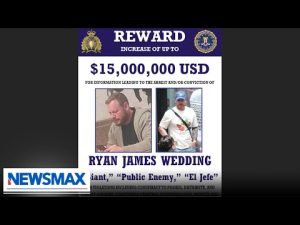In a shocking turn of events that could make even the most sensational television drama seem dull, former Olympic snowboarder Ryan Wedding has found himself on the FBI’s Ten Most Wanted list. Once celebrated for his athletic prowess in the 2002 Winter Olympics in Salt Lake City, Wedding has allegedly traded his snowboards for a life of crime, partnering with Mexican drug cartels to create a massive drug trafficking network. The stakes are high, and the authorities are not taking this lightly. To capture this notorious figure, the State Department has upped the ante, offering a staggering $15 million reward for information leading to his arrest.
The saga of Wedding took a dark twist when the Justice Department unveiled a new indictment that includes serious charges, such as being linked to the murder of a federal witness. This isn’t just a game of hide-and-seek; investigators claim Wedding has built a criminal empire worth hundreds of millions, moving tons of cocaine into the U.S. and Canada each year. Just imagine the sheer scale of his operations, with drugs flowing from Mexico to stash houses in Los Angeles, then hitting the long, winding roads to Canada. The estimated revenue from this colossal operation? A jaw-dropping $1 billion annually. Talk about a profitable career change!
As the feds tighten the noose, Wedding’s history in competitive snowboarding seems like a distant memory. His alleged transformation into a drug kingpin is not just a testament to bad choices; it raises questions about how someone can fall so far from grace. Authorities describe him as a dangerous individual who didn’t just traffic in drugs but also orchestrated violent acts to protect his empire. Imagine facing the wrath of someone who is willing to go to such lengths just to maintain control over their illicit operations. His alleged involvement in multiple murders, both retaliatory and over drug debts, paints a vivid picture of the ruthless world he now inhabits.
However, wedding’s downfall has yet to be fully realized. With deep connections to various criminal networks across North America and the ability to use a range of fake identities—some including nicknames like El Jefe or Public Enemy—it seems he is a step ahead of the law. This is not just a game of cat and mouse; it’s a dangerous chess match where complications arise at every turn. Authorities are focused on tracking him down before he can strike again, highlighting the urgency of the situation.
Comparisons have been drawn between Wedding and infamous drug lords like Pablo Escobar and El Chapo, and rightfully so. The sheer volume of drugs he is accused of trafficking—around 60 metric tons a year, equivalent to the weight of 40 cars—illustrates a level of criminality that is staggering. In the end, it’s hard not to feel a mix of disbelief and intrigue about how someone could go from Olympic glory to international fugitive. As the manhunt continues, one can only hope that justice prevails and that fewer lives are put at risk by the likes of Ryan Wedding.







